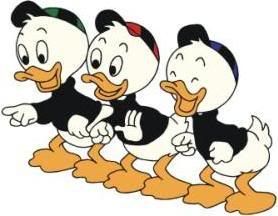 Is it now "official" that first-borns are smarter?
Is it now "official" that first-borns are smarter?
In June, for example, a group of Norwegian researchers released a study showing that firstborns are generally smarter than any siblings who come along later, enjoying on average a three-point IQ advantage over the next eldest—probably a result of the intellectual boost that comes from mentoring younger siblings and helping them in day-to-day tasks. The second child, in turn, is a point ahead of the third.
To a certain extent that is true. But considering that IQ tests actually reveal little more than the ability to take IQ tests, and that three points is a really minimal amount, I think that it can be put down primarily to issues with the IQ test itself. And the way in which each individual's brain is wired to deal with the problems. My older brother is far more mathematical and scientific than me, but lacks any real creativity or imagination, almost a diametric switch to me. We have different interests and specialities. I wouldn't say he's more intelligent than me, but his brain works in a different way.
But being the second of three boys, this is the bit that interested me most:
If eldest sibs are the dogged achievers and youngest sibs are the gamblers and visionaries, where does this leave those in between? That it's so hard to define what middle-borns become is largely due to the fact that it's so hard to define who they are growing up. The youngest in the family, but only until someone else comes along, they are both teacher and student, babysitter and babysat, too young for the privileges of the firstborn but too old for the latitude given the last...
Stuck for life in a center seat, middle children get shortchanged even on family resources. Unlike the firstborn, who spends at least some time as the only-child eldest, and the last-born, who hangs around long enough to become the only-child youngest, middlings are never alone and thus never get 100% of the parents' investment of time and money.
This is something which I have very much noticed all through my life. But is it really being "shortchanged"? Maybe in purely financial or resource-specific ways, but in the long term as a human being, I disagree - it has made me be far more able to deal with a greater range of situations than my brothers. I don't
have to lead like my older brother does but I can, and I don't have the greed and feel the need to differentiate myself from others like my younger brother. I can adapt to fit the situation. I can lead and follow, teach and be taught. This bit, however, it utter bollocks:
Siblings who hope to stand out in a family often do so by observing what the elder child does and then doing the opposite. If the firstborn gets good grades and takes a job after school, the second-born may go the slacker route. The third-born may then de-de-identify, opting for industriousness, even if in the more unconventional ways of the last-born. (TIME) When it comes to birth order, it really makes very little difference in the long run. They give different advantages and disadvantages. The gap in the IQ test is minimal and within the accuracy of IQ tests. The social differences allow people to fit into different niches. Birth order itself doesn't give benefits without disadvantages, or vice versa.
Source: TIME







































